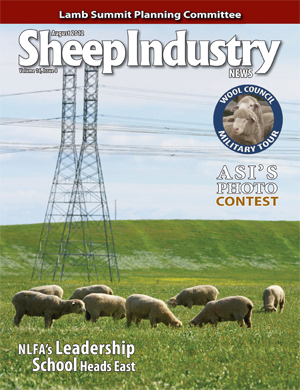By AMY TRINIDAD
Sheep Industry News Editor
(August 1, 2012) For thousands of years, shepherds have harnessed sheep to manipulate vegetation. With today’s vast web of human developments, such as roads, power lines, recreation and rural development, coupled with environmental concerns, land and livestock managers are required to operate with greater care. Due to these concerns, a new non-profit entity called Urban Shepherds has been created to promote urban and suburban sheep grazing as a cost-effective and environmental alternative to mowing.
Urban Shepherds was born out of a request from Michael Fleming, the executive director of the St. Clair Superior Development Corporation, to mow vacant land in Cleveland, Ohio, to Laura DeYoung, an environmental planning consultant and sheep producer from Peninsula, Ohio.
“The idea behind the venture is to save money by grazing sheep instead of mowing, reducing environmental impacts and providing urban farming education while entertaining the public,” explains DeYoung, who will celebrate her fifth anniversary as a sheep producer in September at The Spicy Lamb Farm.
In Ohio, where the grass grows from March until mid-October, mowing expenses can be costly. In fact, the city of Cleveland spends $3.3 million a year mowing just vacant lots.
For Urban Shepherds, a vacant lot located between an apartment building and a marina in Cleveland is the organization’s starting point for grazing possibilities. The board is looking to expand to largely unoccupied industrial/commercial and residential sites, the areas under power lines, schools, parks and corporate grounds.
The actual logistics of matching potential grazing urban areas with sheep producers who would like to take advantage of getting paid to graze their sheep requires a great deal of research. Issues like zoning for agricultural use in municipalities, design review for temporary shelters and even approval from the health department have to be considered.
However, in Cleveland, agricultural zoning for small ruminants is permitted and sustainable urban farming is encouraged in the future land-use plan.
DeYoung, executive director of Urban Shepherds, along with her associates, Wayne Miller, associate director and Ohio sheep producer; Fleming; Brendan Trewella, a non-profit consultant and volunteer shepherd for the organization; and Heather Walters, a green building consultant and community supported agriculture (CSA) farmer in Peninsula, plan to expand Urban Shepherds regionally throughout the eastern United States.
“We now envision Urban Shepherds growing regionally to not only vacant urban lots but other large lots such as schools, parks, utility line and industrial and commercial parkways,” explains DeYoung. “As we grow, we will become the link between shepherds and flocks and urban and suburban lawns.”
A key component of Urban Shepherds is the recruitment, training and use of volunteer shepherds. “The volunteer shepherds make the program work. They are trained to check on the sheep daily, assist with their care and report any possible ailments back to us,” says DeYoung.
They are trained through a one-day course run by professional shepherds at The Spicy Lamb Farm which covers conservation grazing, the shepherd’s calendar, how to handle sheep and installation and maintenance of electric sheep netting.
DeYoung sees the development of this organization as a win-win for both sheep producers and municipalities. “They are going to pay us to graze our sheep but they are still saving money, cutting costs as much as half. In addition the sheep are fertilizing the land and providing educational opportunities while enhancing the environment.”
The Spicy Lamb Farm
Spending a portion of her childhood in the United Kingdom, DeYoung became familiar with the sheep industry. And when she was provided with the opportunity to lease a national park farm in the Cuyahoga Valley National Park (CVNP) in Ohio, raising sheep was the first thing that came to mind.
The CVNP, which was created in the 1970s, is part of the countryside initiative farm lease program; a unique modern sustainable farmland rehabilitation and revitalization plan, making the CVNP an agricultural provider.
As part of DeYoung’s lease with the CVNP to raise livestock, The Spicy Lamb Farm’s mission must include working as an economically viable farm, provide agritourism opportunities and educate the public on the critical need for local, sustainable farming. In addition to her 50 head ewe flock of Dorsets for meat and wool production, DeYoung also grows a spicy herb and vegetable garden and has started an orchard with a variety of apples, pears and plums.
“We have a 60-year lease of the farm and I am dedicated to educating the public on the critical need for local, sustainable farming and environmental stewardship,” she says, adding that the farm provides tours, lambing days, sheep shearing demonstrations, border collie demonstrations, fiber workshops, educational lectures, hay wagon rides and culinary dinners and picnics.
Entering the sheep industry a mere five years ago, DeYoung says she has experienced many ups and downs relative to the industry. And with that experience, has come advice she likes to share with those new to the industry.
“One, you need a mentor. You can read all the books out there and think you know what you are doing, but nothing compares to learning from those experienced in the industry. Two, think carefully about what kind of flock you want and where you are going to get them from. And three, find your own management style.”
By offering agritourism, selling lamb through the park’s CSA, developing blankets from the wool and promoting the industry through the farm’s new venture, Urban Shepherds, DeYoung hopes that she is exposing more people to the sheep industry so that they have a clearer picture of where their food comes from and a better appreciation for the need to care for the land that supports those animals.


